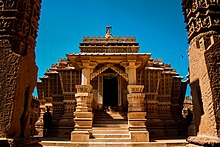Lodhurva Jain temple
| Lodhurva Jain temple | |
|---|---|
 Parshvanath temple, Lodhurva | |
| Religion | |
| Affiliation | Jainism |
| Sect | Śvētāmbara |
| Deity | Parshvanath |
| Festivals | Mahavir Jayanti |
| Governing body | Sri Jaisalmer Lodravpur Parshwanath Jain Shwetamber Trust |
| Location | |
| Location | Lodhruva, Jaisalmer, Rajasthan |
| Geographic coordinates | 26°59′7.3″N 70°48′9.5″E / 26.985361°N 70.802639°ECoordinates: 26°59′7.3″N 70°48′9.5″E / 26.985361°N 70.802639°E |
| Architecture | |
| Style | Māru-Gurjara architecture |
| Date established | 9th century CE |
| Temple(s) | 2 |
Lodhurva Jain temple is a Jain temple in the Lodhruva village of Jaisalmer district in Rajasthan.[1]
History[]
Lodhruva was established as the capital by Rawal Deoraj, the Bhati clan, in 8th−9th century CE.[2][3][4] The temple was constructed in the 9th century along with city of Lodhruva. Rawal Jaisal, a famous prince of the Bhati clan, moved his capital from Lodhruva to Jaisalmer in 1156 CE.[5][6][7] The temple was also plundered by Mahmud of Ghazni and Muhammad of Ghor. This led to temple being destroyed in 1152 CE. In 1615 CE, the temples undergone repairs and renovations.[8] The temple remains the only standing structure in the ruined city of Lodhruva.[9][10]
About temple[]

Lodhurva is one of the important Jain center. The temple is built with yellow limestone and sandstone;[11] famous for the intricate craftsmanship. The temple features ornate torana (arched gateway), and stone carvings of Kalpavriksha and kalputra.[12][13][14] Lodhurva Jain temple is considered one of the best example of Jain architecture in Rajasthan.[15][16] According to William Guy, the temple walls are folded similar to an accordion and features exquisite screen carvings of jali.[17][18]
The mulnayak (main deity) of the temple is a black marble idol of Parshvanatha.[19] In Shvetambara tradition, idols tend to derive their name from a geographical region, the lodhurva Parshvanath is one of 108 prominent idols of Parshvanath idols.[20]
According to Jain belief, A snake comes out every evening from a hole in the temple to drink milk offering. As per popular belief, the sight of this snake is a blessing.[13]
Gallery[]
Ceiling with carvings of devkulikas

Ornate torana

Parshvanath idol
Sambhavanatha temple inside the temple complex

Unique facade designs of Lodurva temple
See also[]
References[]
Citations[]
- ^ Shaq & Padhya 2019, p. 4.
- ^ Tod 1832, p. 239.
- ^ Rough Guides 2016, p. 307.
- ^ The New Zealand Herald 2019.
- ^ Bradshaw 1864, p. 301.
- ^ Bayley 2004, p. 65.
- ^ Burgess 1879, p. 81.
- ^ Shah 1987, p. 179.
- ^ Sharath 2013.
- ^ Coolidge 1879, p. 182.
- ^ Kaur & Kaur 2019, p. 1.
- ^ Thapar 2012, p. 224.
- ^ a b Kapoor 2002, p. 3681.
- ^ The Times of India 2011.
- ^ MoEFCC, pp. 7–8.
- ^ Yeadon 2004, p. 121.
- ^ Guy 2001, p. 218.
- ^ Betts & McCulloch 2013, p. 139.
- ^ Sinha 2007, p. 93.
- ^ Cort 2001, p. 234.
Sources[]
Books[]
- Bayley, C. S. (2004) [1894], Chiefs and Leading Families in Rajputana, New Delhi: Asian Educational Services, ISBN 9788120610668
- Betts, Vanessa; McCulloch, Victoria (2013), India - The North: Forts, Palaces, the Himalaya Dream Trip, Footprint Dream Trip (1st ed.), Footprint Travel Guides, ISBN 9781907263743
- Bradshaw, George (1864), Bradshaw's Hand-Book to the Bombay Presidency, and North-Western Provinces of India, Bradshaw's Guide, London: W.J. Adams
- Burgess, James (1879), Indian Antiquary, The Indian Antiquary, 4, Bombay: British India Press
- Coolidge, A. C. (1879), The Rajputana gazetteer, The Rajputana gazetteer, Calcutta: Offices of the Superintendent of Government
- Cort, John E. (2001), Jains in the World: Religious Values and Ideology in India, Oxford University Press, ISBN 978-0-19-803037-9
- Guy, William (2001), Getting Down at Bhubaneshwar: And Other Indian Adventures, Xlibris, ISBN 9781477148426
- Kapoor, Subodh (2002), The Indian Encyclopaedia: Indo-Pak War-Kamla Karri, The Indian Encyclopaedia: Biographical, Historical, Religious, Administrative, Ethnological, Commercial and Scientific, 12, Delhi: Genesis Publishing Pvt Ltd, ISBN 9788177552690
- Shah, Umakant Premanand (1987), Jaina-rūpa-maṇḍana: Jaina iconography, Abhinav Publications, ISBN 978-81-7017-208-6
- Thapar, Bindia (26 June 2012), Introduction to Indian Architecture, Periplus Asian Architecture Series, Tuttle Publishing, ISBN 9781462906420
- Tod, James Tod (1832), Annals and Antiquities of Rajast'han: Or the Central and Western Rajpoot States of India, 2, Smith, Elder and Company
- The Rough Guide to India (Travel Guide eBook). Rough Guides. Rough Guides. 2016. ISBN 9780241295397.
- Sinha, Juhi (2007), Beyond the Dunes: Journeys in Rajasthan, Penguin Books, ISBN 9780143063063
- Yeadon, David (2004), National Geographic Guide to the World's Secret Places: Escapes to Unspoiled and Undiscovered Earthly Paradises, National Geographic, ISBN 9780792265641
Web[]
- Sharath, Lakshmi (27 September 2013). "A silent past". The Hindu. Retrieved 28 December 2020.
- "Living legacy: Jaisalmer Fort". The Times of India. 14 April 2011. Retrieved 28 December 2020.
- "India: Rich pleasures in the land of rajahs". The New Zealand Herald. 3 May 2019. Retrieved 28 December 2020.
- "Project Report" (PDF). Ministry of Environment, Forest and Climate Change. Retrieved 28 December 2020.
- Shaq, Qureshi Mo. Sufiyan Mo.; Padhya, Himanshu Jawahar (January 2019). "An Overview of Tourist Circuits: A Case of Rajasthan" (PDF). International Journal of Management, Technology And Engineering. ISSN 2249-7455. Cite journal requires
|journal=(help) - Kaur, Parminder; Kaur, Gurpreet (April 2019). "Jaisalmer Golden Limestone and Sandstone: A Heritage Stone Province from the Desert of Western India". Egu General Assembly Conference Abstracts. Harvard University Press: 968. Bibcode:2019EGUGA..21..968K. ISSN 2249-7455.
External links[]
 Media related to Jain Temple, Lodurva at Wikimedia Commons
Media related to Jain Temple, Lodurva at Wikimedia Commons
- Jain temples in Rajasthan
- 9th-century Jain temples
- Jaisalmer district





